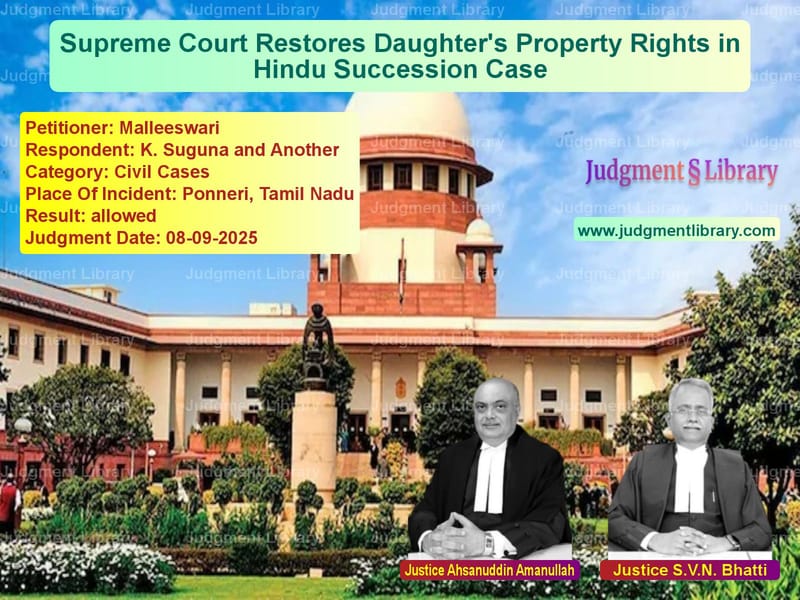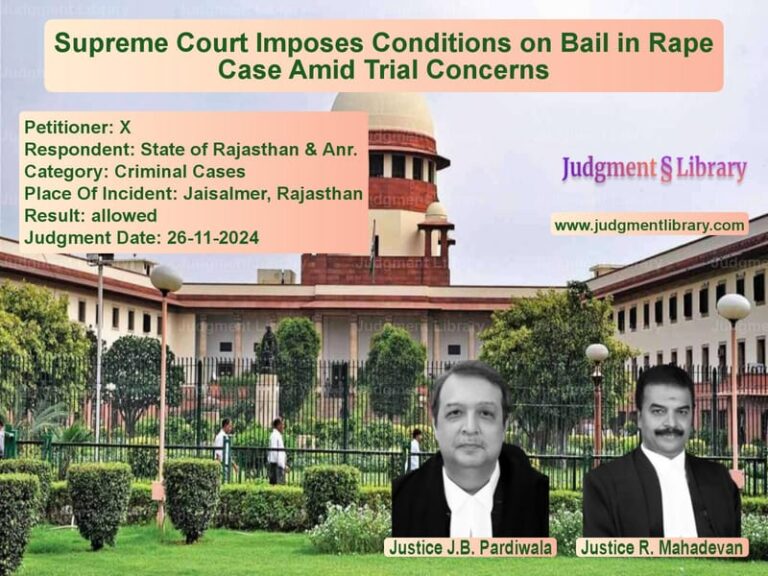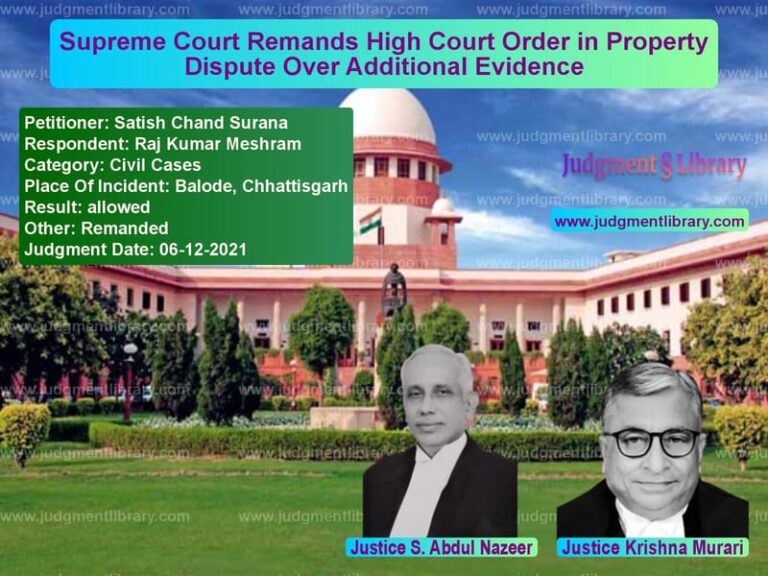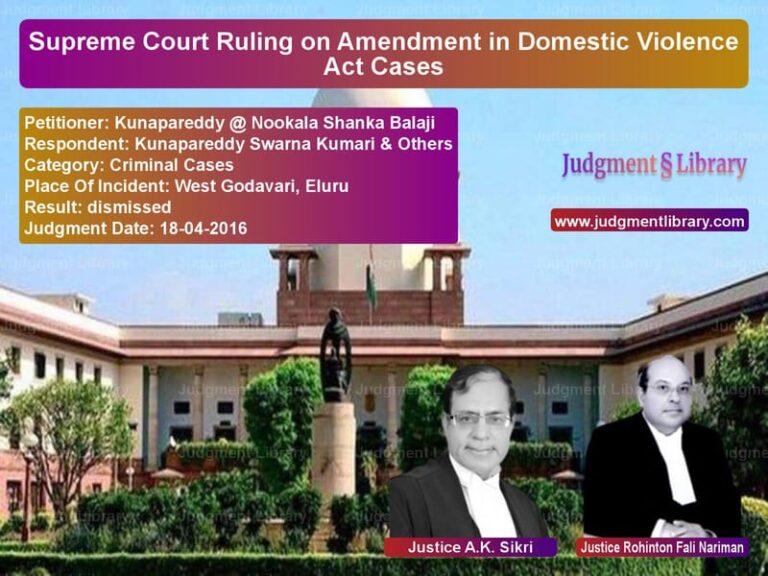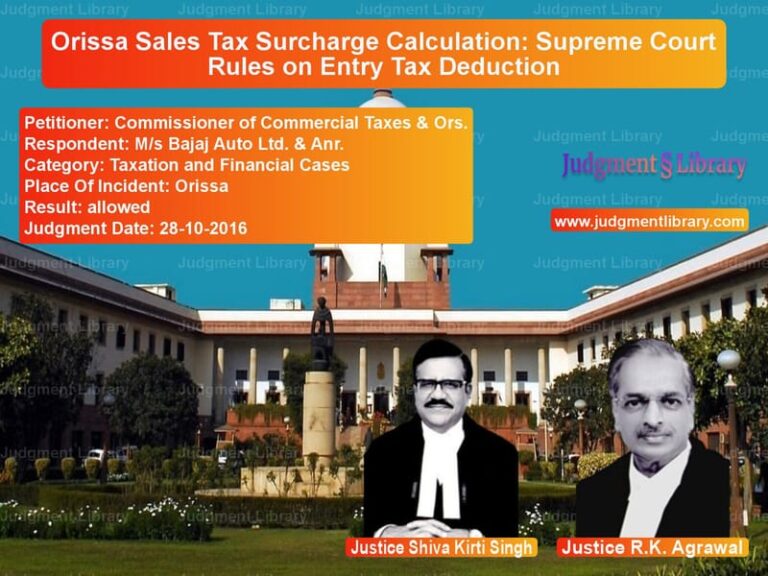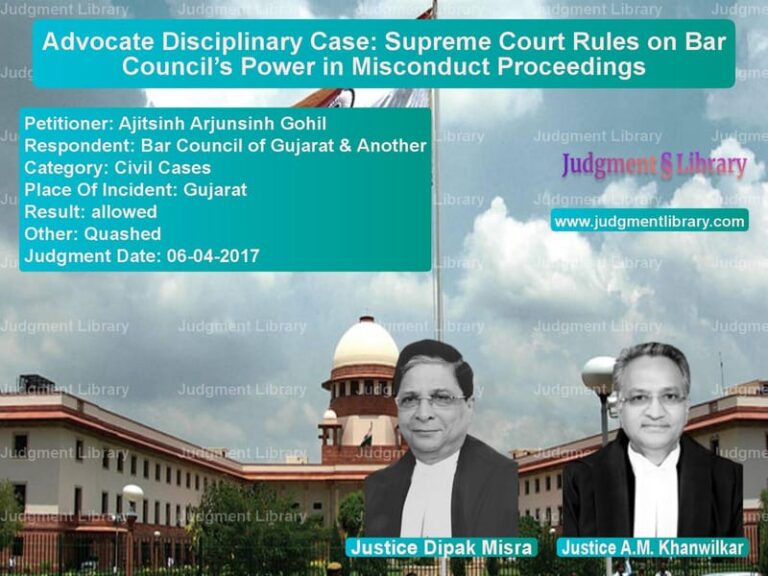Supreme Court Restores Daughter’s Property Rights in Hindu Succession Case
In a landmark judgment that reinforces the rights of daughters in ancestral property, the Supreme Court of India recently delivered a verdict that clarifies the application of the Hindu Succession (Amendment) Act, 2005, to pending partition suits. The case involved a complex family dispute over ancestral properties that had been winding through the Indian judicial system for over two decades. At the heart of the matter was Malleeswari, a daughter fighting for her rightful share in her father’s ancestral property, challenging a preliminary decree that had been passed without considering her rights as a coparcener. The judgment not only addresses the specific rights of the daughter in this case but also provides crucial clarity on the scope of review jurisdiction in civil matters.
The legal battle began in 2000 when Subramani, Malleeswari’s brother, filed a partition suit (OS No. 192 of 2000) in the Court of the District Munsiff at Ponneri, seeking division of ancestral properties into two equal shares between himself and their father, Munasamy Naidu. Notably, Malleeswari was not made a party to this original suit, despite being the daughter and thus a potential coparcener in the ancestral properties. The suit claimed that the properties were ancestral and available for partition between the plaintiff and defendant as members of the Hindu Undivided Family. The plaint specifically referred to a registered partition deed dated November 22, 1991, executed between the deceased first defendant and his brother to establish the ancestral character of the properties.
On February 25, 2003, the Trial Court passed an ex-parte preliminary decree granting the partition as prayed for, essentially dividing the properties equally between the father and son. This decree was passed without Malleeswari’s participation since she hadn’t been impleaded in the suit. Following this decree, significant transactions occurred that would later become central to the legal dispute. The father, Munasamy Naidu, executed a registered sale deed on December 27, 2004, in favor of K. Suguna (the first respondent) for items 4 to 7 of the suit property. He also executed a settlement deed for items 1 to 3, and 8 to 10 in favor of Malleeswari, the appellant. Subsequently, on January 24, 2005, the second respondent (Subramani’s wife, representing him after his death) filed an application for passing a final decree in terms of the preliminary decree.
The case took a crucial turn when Malleeswari filed I.A. No. 1199 of 2018, seeking amendment of the preliminary decree to recognize her status as a coparcener and entitle her to an equal share along with her father and brother. Her argument rested primarily on the Hindu Succession (Amendment) Act, 2005 (HSA 2005), which grants daughters equal coparcenary rights by birth. As a daughter of a living coparcener at the time the Act came into force, she claimed entitlement to a 1/3rd share. Additionally, she claimed her father’s 1/3rd share through a Will dated April 23, 2008, bringing her total claim to 2/3rd share. She also contended that the sale to the first respondent on December 27, 2004, was invalid as it occurred after the amendment’s cut-off date of December 20, 2004, and violated the court’s injunction order.
The respondents opposed this application on multiple grounds. They argued that the application was barred by limitation, having been filed over 15 years after the preliminary decree and 7 years after the petitioner admittedly became aware of the suit. They also contended that Malleeswari was estopped from challenging the sale to the first respondent since she had been an attesting witness to the sale deed. Furthermore, they maintained that the preliminary decree had already ascertained and finalized the shares in 2003, before the 2005 amendment came into force, and that the proper remedy was to appeal the preliminary decree rather than seek its amendment.
The Trial Court dismissed Malleeswari’s application on March 8, 2019, holding that she was impleaded only as the legal representative of her deceased father and thus merely stepped into his shoes, entitled only to the share determined by the 2003 decree. The court also ruled that the HSA 2005 could not be applied retroactively, that the settlement deed was void as it was created after the suit had been filed and a decree passed, and that Malleeswari was barred by the principle of estoppel since she had witnessed the sale deeds. The court emphasized that a preliminary decree represents a final determination of rights and can only be amended for clerical errors, not to fundamentally change the outcome.
Malleeswari then filed CRP No. 1439 of 2019 in the High Court of Judicature at Madras, which was allowed on September 23, 2022, setting aside the Trial Court’s order. However, the first respondent filed a review application, which was allowed through the impugned order dated October 19, 2024, remanding the matter to the Trial Court for fresh consideration. This led to the present civil appeal before the Supreme Court.
Before the Supreme Court, Mr. V. Prabhakar, learned Senior Advocate appearing for the appellant, contended that “the High Court fell into a grave and serious error in not appreciating the review jurisdiction conferred on the Courts by Section 114 and Order 47 Rule 1 of the Civil Procedure Code, 1908 (‘CPC’). The consideration and conclusion in the impugned order are not available to a review court. The scope of judicial review of an interlocutory order under Article 227 of the Constitution of India is extremely narrow and limited.” He argued that the review order had recorded fresh findings on facts by overturning earlier findings and that the appellant was entitled to a share both under Section 29A of the Hindu Succession Act (Tamil Nadu Amendment Act), 1989, and the HSA 2005.
The respondents, represented by Ms. Shobha Ramamoorthy and Dr. Sivabalamurugan, argued that the impugned order did not transgress review jurisdiction and that the matter was properly remanded to the Trial Court. They contended that “the Appellant has been a silent spectator and cannot reopen the preliminary decree to claim the settled share of late Munusamy Naidu or her 1/3rd share” and that “the Appellant cannot expand the preliminary decree and should have acted promptly during the pendency of OS No. 192 of 2000.”
The Supreme Court, in its analysis, delved deep into the scope and limitations of review jurisdiction. The Court meticulously examined the principles governing review proceedings, stating that “the review proceedings are not by way of an appeal and have to be strictly confined to the scope and ambit of Order 47 Rule 1 of CPC.” The Court emphasized that “review is not to be confused with appellate powers, which may enable an appellate court to correct all manner of errors committed by the subordinate court” and that “in exercise of the jurisdiction under Order 47 Rule 1 of CPC, it is not permissible for an erroneous decision to be reheard and corrected. A review petition, it must be remembered, has a limited purpose and cannot be allowed to be an appeal in disguise.”
The Court further elaborated that “the power of review can be exercised for the correction of a mistake, but not to substitute a view. Such powers can be exercised within the limits specified in the statute governing the exercise of power” and that “the review court does not sit in appeal over its own order. A rehearing of the matter is impermissible. It constitutes an exception to the general rule that once a judgment is signed or pronounced, it should not be altered. Hence, it is invoked only to prevent a miscarriage of justice or to correct grave and palpable errors.”
The Supreme Court specifically addressed the grounds available for review, noting that they include discovery of new and important matter or evidence, mistake or error apparent on the face of the record, and “any other sufficient reason” analogous to the other two categories. Regarding errors apparent on the face of the record, the Court clarified that “there must be something more than a mere error, and it must be the one which is manifest on the face of the record. Such an error is a patent error and not a mere wrong decision. An error which has to be established by a long-drawn process of reasoning on points where there may conceivably be two opinions can hardly be said to be an error apparent on the face of the record.”
Applying these principles to the case at hand, the Supreme Court found that “the impugned order has not adverted to an error apparent on the face of the record, but has taken up an error on reappreciation of the case and counter case of the parties. The review order records a few findings extending far beyond the actual working out of prayers in a suit for partition. The order impugned has exceeded the jurisdiction of review by a court.”
The Court consequently set aside the impugned order and restored the High Court’s order dated September 23, 2022, which had recognized Malleeswari’s rights as a coparcener. The Supreme Court directed the Trial Court to expeditiously dispose of all pending applications, preferably within three months from the date of receipt of the judgment.
This judgment represents a significant victory for daughters’ rights in ancestral property and provides crucial clarity on the scope of review jurisdiction. By reinforcing the principles established in the Vineeta Sharma v. Rakesh Sharma case regarding daughters’ coparcenary rights, the Supreme Court has ensured that technical procedural aspects don’t defeat substantive rights granted by progressive legislation. The judgment also serves as an important reminder about the limited nature of review jurisdiction, preventing it from being used as a disguised appeal to reopen settled matters. For countless daughters across India fighting for their rightful share in ancestral properties, this judgment strengthens their legal position and ensures that their rights are protected even in long-pending partition suits.
Petitioner Name: Malleeswari.Respondent Name: K. Suguna and Another.Judgment By: Justice Ahsanuddin Amanullah, Justice S.V.N. Bhatti.Place Of Incident: Ponneri, Tamil Nadu.Judgment Date: 08-09-2025.Result: allowed.
Don’t miss out on the full details! Download the complete judgment in PDF format below and gain valuable insights instantly!
Download Judgment: malleeswari-vs-k.-suguna-and-anothe-supreme-court-of-india-judgment-dated-08-09-2025.pdf
Directly Download Judgment: Directly download this Judgment
See all petitions in Property Disputes
See all petitions in Succession and Wills
See all petitions in Damages and Compensation
See all petitions in Other Cases
See all petitions in Judgment by Ahsanuddin Amanullah
See all petitions in Judgment by S.V.N. Bhatti
See all petitions in allowed
See all petitions in supreme court of India judgments September 2025
See all petitions in 2025 judgments
See all posts in Civil Cases Category
See all allowed petitions in Civil Cases Category
See all Dismissed petitions in Civil Cases Category
See all partially allowed petitions in Civil Cases Category

